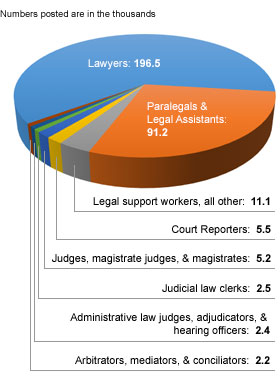The work life of a lawyer is generally busy, but could lead to one of the more financially stable careers in the broad field of criminal justice. Not only do lawyers usually advise and represent clients (individuals, businesses and government agencies) on legal issues in court, they also likely conduct legal research and develop interpretations based on various rulings and regulations. Also known as attorneys, lawyers act as both advocates and advisors for their clients.
How to Become a Lawyer
Those looking to become lawyers should expect about 7 years of study at higher learning institutions – this includes 4 years of undergraduate study followed by 3 years of law school. While many law schools differ from medical schools in that they do not require students to take specific coursework during their undergraduate careers, courses in English, history, government, public speaking, economics and mathematics could be beneficial. Undergraduate students should also be prepared to take the Law School Admission Test (LSAT), as most law schools will require it. The test is designed to measure applicants’ facility for studying law and their proficiencies in various areas of legal study.
Becoming a practicing lawyer also requires proper licensing, which is achieved by passing “bar exams.” Most states require that applicants graduate from an ABA-accredited law school, pass one or more written bar exams, and be found by an admitting board to have the character to council and represent others. For more details on individual state and jurisdiction requirements, visit the National Conference of Bar Examiners.
Salary
Although a lawyer’s salary will largely depend on factors such as experience and the type and size of his or her firm, The Bureau of Labor Statistics reports that the median annual wage for lawyers was $113,530 in May 2012. The top five industries were broken down as follows:
Finance and insurance: $134,940
Federal government, excluding postal service: 134,690
Legal services: 116,630
Local government, excluding education and hospitals: 87,140
State government, excluding education and hospitals: 79,220
It should also be reported that lawyers who own their own practices usually earn less than those who are partners in law firms.
Work Life
Lawyers often work full time and for long hours, given the amount of research and preparation cases typically require. This is likely true for both private practices and large firms. In terms of work environment, most lawyers work in offices, but will often travel to meet certain types of clients. Possibilities include homes, hospitals, or even prisons. Lawyers could also travel to appear before courts. Still, though, any travel would take place on top of all the research and preparation generally necessary to be a successful attorney.
For more information about law schools and a career in law, please visit http://www.bls.gov/ooh/legal/lawyers.htm#tab-1
Citation
Bureau of Labor Statistics, U.S. Department of Labor, Occupational Outlook Handbook, 2014-15 Edition, Lawyers,
on the Internet at http://www.bls.gov/ooh/legal/lawyers.htm (visited October 10, 2014).
